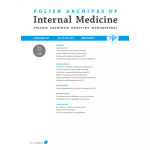Clostridioides difficile infection in coronavirus disease 2019 (COVID-19): an underestimated problem?
 Introduction:
Introduction:
The use of antibiotics and possibility of microbiota disruption during the coronavirus disease 2019 (COVID‑19) pandemic have raised questions about the incidence of Clostridioides difficile infection (CDI).
Objectives:
This study aimed to assess the frequency of and risk factors for CDI in patients with COVID‑19.
Patients and methods:
We conducted a retrospective, single‑center evaluation study on the frequency of and risk factors for CDI in patients with COVID‑19 and in the prepandemic era. The analysis included 441 patients with severe acute respiratory syndrome coronavirus 2 (SARS‑CoV‑2) infection and 2961 pa‑ tients hospitalized before the pandemic.
Results:
A significant increase in the incidence of CDI was noted during the COVID‑19 pandemic compared with the prepandemic period: 10.9% versus 2.6%, P <0.001. Risk factors for CDI in patients with COVID‑19 included: age, length of hospital stay, occurrence of diarrhea during hospitalization, use of antibiotics other than azithromycin, and coexistence of nervous system disease or chronic kidney disease-all of these factos had a weak association with CDI development. The multivariable logistic regression model indicated other unassessed variables that had an impact on the CDI incidence rate.
Conclusions:
We observed a higher incidence of CDI in patients with COVID‑19. Antibiotic therapy was a relevant risk factor for CDI, although its effect was weak. Other drugs used during the pandemic were not found to have an impact on disease development. Possible causes of CDI may include fecal microbiota disruption by SARS‑CoV‑2 infection, but further research is needed to validate this hypothesis.
Konrad Lewandowski, Mariusz Rosołowski, Magdalena Kaniewska, Piotr Kucha, Anna Meler, Waldemar Wierzba, Grażyna Rydzewska
Pol Arch Intern Med. 2021 Feb 26; 131(2): 121-127
doi: 10.20452/pamw.15715. Epub 2020 Dec 14.
